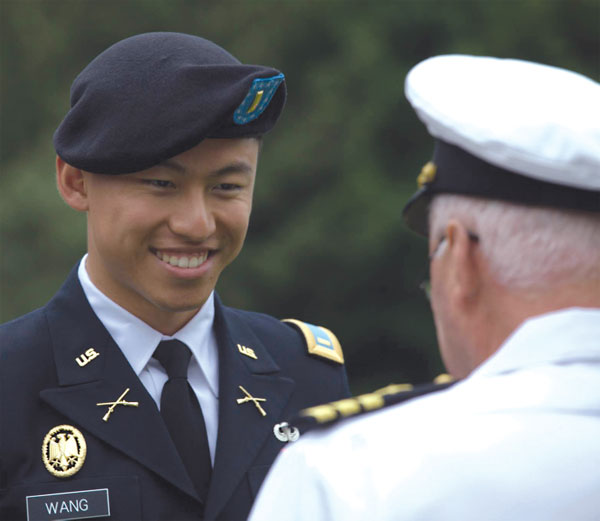Chinese cadets' numbers rise in US military academies
Updated: 2014-08-07 11:01
By Li Ang in New York (China Daily USA)
|
||||||||
Overcoming old cultural stigma attached to a career in uniform
For China-born William Wang, who just graduated from West Point, serving in the military is a way of showing his interest in "the prosperity of this nation".
Aside from "the sense of purpose, pride and discipline" of the military, what also attracted Lt Wang to the military was the opportunity to promote Chinese Americans' voice in US society, which he thinks is disproportionately weak.
|
Lt William Wang (left) in uniform at the graduation ceremony at West Point on May 28. He is off to serve in the 2nd Brigade Combat Team in Hawaii for a five-year tour of duty. Provided to China Daily |
Chinese Americans, he said, "typically favor careers in medicine, business, law and academia". But, he added: "their cultural stigma about military service diminishes their social leadership and political influence."
With Asian-American enrollment in US military academies steadily on the rise over the last four years, the percentage of Asian-American students peaked with the class of 2017.
At the US Military Academy at West Point, for example, the class of 2009 had 62 Asian Americans or 5 percent of the class, according to the school's public affairs office. The class of 2017 has 84 Asian Americans, or 7 percent.
Asian-American students accounted for 2.5 percent of the US Merchant Marine Academy's class of 2011 and 8 percent of the class of 2017, according to the school.
At the US Coast Guard Academy, the percentage of Asian-American students has remained in the 4-to-6 percent range since 2009, according to the school. At the US Naval Academy, the portions are 3.6 percent in the class of 2014 and 7.1 percent in the class of 2017, numbers from the school show.
"I think it's a good thing for Chinese-American community because they'll have a voice in the military and the government," said Kytoh Li of Flushing, New York, who was accepted to the US Naval Academy at Annapolis this year.
Li was nominated by Congresswomen Grace Meng to both the US Naval Academy and the Air Force Academy and was accepted at both. "I love flying," he said. "Surprisingly, the Navy has more planes and cooler planes than the Air Force, to be honest. So I chose to go there."
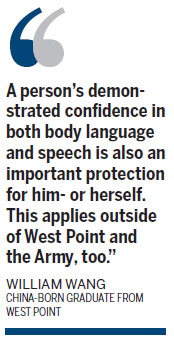
Li calls more Asian Americans in military academies "a great opportunity". "They are opening up to diverse groups of people. It exposes the military in general to all these different cultures, getting different perspectives."
Julia Hsu, 19, also from Flushing, was accepted into a five-year program at West Point this year. "Everybody has an equal chance of doing anything here," she said. "It's getting really diverse, which is good, so there's no racism."
Hsu said she would probably major in engineering and wasn't worried at all about the possibility of being sent to the frontlines in battle.
"I did think about it, but I'm not scared," she said. "My parents still worry about it." Both of Hsu's parents are from Taiwan.
Hsu also said there's nothing inconvenient about being a girl joining the army. "It's based on what you want, and you should go for it," she said. "Girls are just as strong as boys."
Wang feels that too few Asian-American cadets were willing to strive for key leadership positions during his years at West Point, where he served as commander for 300 cadets during basic training and command sergeant major for a 1,110-cadet regiment during senior year.
Wang, who immigrated to the US from China with his family at the age of 12 and graduated valedictorian of his Virginia high school class, said that thanks to enhanced protection, racial discrimination against minorities was no longer a serious issue at West Point.
"A person's demonstrated confidence in both body language and speech is also an important protection for him- or herself. This applies outside of West Point and the Army, too," he said.
"Making friends from other races is not that difficult, as long as you are open and willing to do so," he said.
For China Daily
(China Daily USA 08/07/2014 page2)
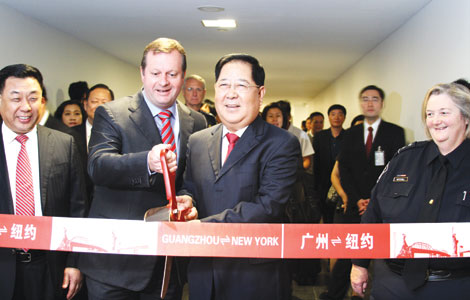
 China Southern launches Guangzhou-New York service
China Southern launches Guangzhou-New York service
 US funded Chinese fashion website targets a new customer segment
US funded Chinese fashion website targets a new customer segment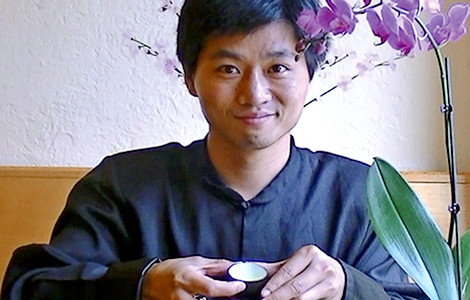
 'Dr Tea' takes on the US
'Dr Tea' takes on the US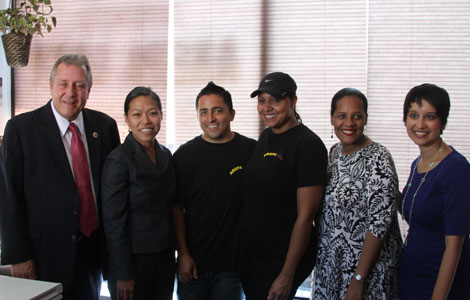
 NYC spurs small business
NYC spurs small business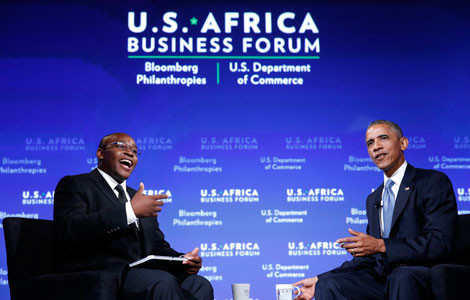
 US-Africa summit starts with development fora
US-Africa summit starts with development fora
 Two double-decker buses collide in New York
Two double-decker buses collide in New York
 Life in quake-hit areas of Southwest China
Life in quake-hit areas of Southwest China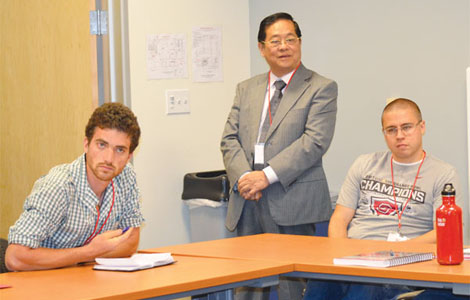
 Getting teachers to teach about China
Getting teachers to teach about China
Most Viewed
Editor's Picks

|

|

|

|

|

|
Today's Top News
China Southern's new NYC flight 'a gift': CEO
Compromise called for in Sino-US ties
Firms are asked to cooperate antitrust probes
Rescuers race to save lives as quake toll nears 600
589 dead as strong quake jolts SW China
China to punish Chrysler, Audi for anti-trust violations
US interest in Africa grows
Chinese firm developing Ebola reagent
US Weekly

|

|
